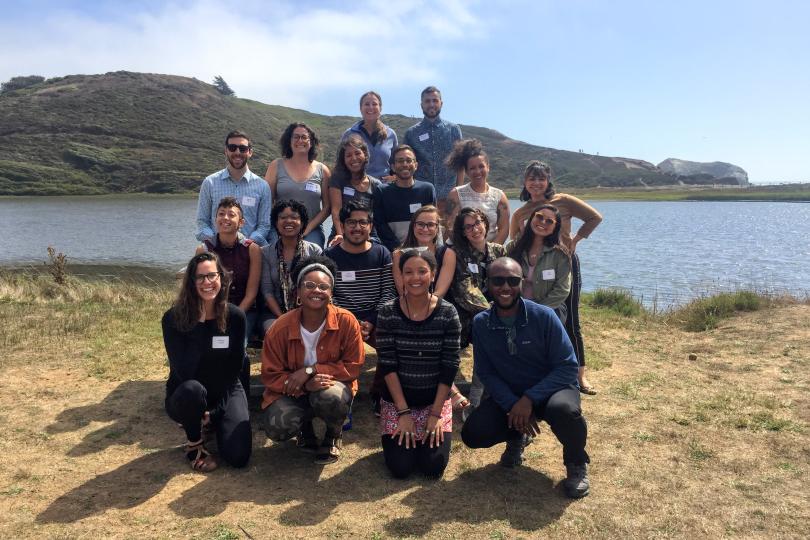How to Apply
Applications for 2026 Switzer Fellowships are now closed.
Applicants must read the eligibility requirements and application guidelines on the Become a Fellow page carefully before applying. Successful applications take a lot of time and work, and incomplete applications will not be reviewed.
Black, Indigenous and students of color, first-generation college students, and individuals from groups traditionally underrepresented in environmental graduate programs are strongly encouraged to apply. Visit the application guidelines and FAQ to learn more.
If you have a question not answered in the FAQ, please see staff contact information at the bottom of this page.
All applicants must submit an online application form, found at the bottom of this page. The application form enables applicants to save their work, make edits and track progress during the review process. Specific application instructions are provided on the application form. The general guidance below is intended to help you prepare the necessary documentation. Please review the evaluation criteria rubric and application guidelines for more detail.
It can be helpful to talk with a Switzer Fellow alum for perspective about the application process. Applicants may look in the Fellow Directory to find fellowship alumni from your school, or submit a request (by December 15th) for help connecting with a past fellow. Watch a recorded information session with staff and recent fellows to gain valuable perspective.
APPLICATIONS WILL NOT BE CONSIDERED COMPLETE UNLESS ALL OF THE REQUIRED MATERIALS ARE SUBMITTED ON TIME AS INSTRUCTED. We cannot allow any exceptions.
The following materials are required:
- A 2-3 page original essay. The written essay is the best way for us to get a sense of your commitment to positive environmental and social change. The essay is an opportunity for you to reflect on your leadership skills and potential, how you plan to apply your skills and studies to your career, and how you will advance equity as a fundamental part of your environmental problem-solving. You may describe your academic work and how it furthers your goals, but academics should not be the sole focus of the essay. Use the essay to talk about why your chosen field matters to you, who is impacted by your work, and how your background, personal experiences and studies prepare you to achieve your goals. Include specific examples of how you have been or hope to be a leader and contribute to advancing environmental and social change. You may also describe any personal and professional challenges you have overcome to achieve your goals. We welcome a range of communication and leadership styles. Communicating your personal story, unique leadership skills and potential, and commitment to applied environmental and social change is more important than polished writing skills. The essay field is limited to 10,000 characters (approximately three pages, single spaced, in 12-point font.)
- Two professional letters of recommendation. Recommendation letters must be submitted by your recommender directly to the foundation per the Recommendation Instructions. Letters can be from your academic advisors or close colleagues who know you and your work well, as we ask recommenders to relay specific information and examples of your work. It is helpful for one of the two letters to be from your academic advisor, a committee member, or academic colleague, especially for Ph.D. applicants. Your second recommender can be anyone familiar with your professional or volunteer experience, leadership roles, or other accomplishments. (Please refer to the Frequently Asked Questions for guidance on choosing your recommenders.) Only two letters of recommendation may be submitted. You are responsible for ensuring that your recommenders send their letters by the application deadline, and that they carefully review the recommendation instructions to ensure they are giving us the information we need. Recommendation letters must be uploaded in Adobe PDF format.
- A current resume. Your resume is an important part of your application and should include a summary of academic experience, work experience and volunteer activities. Please do not include a CV - we are more interested in your overall work and volunteer experience than a list of your publications and presentations, particularly for Ph.D. students. Please include a brief description of the various roles and responsibilities and indicate the amount of time devoted to each position (e.g., full-time, part-time, seasonal, etc.). Resumes must be uploaded in Adobe PDF format.
- Most recent graduate academic transcripts. A transcript of your graduate study is required (an unofficial version is acceptable if official transcripts cannot be obtained by the application deadline). Transcripts must be uploaded in Adobe PDF or JPEG format. Undergraduate transcripts are not necessary except in the case of applicants enrolling in one-year master's programs with no other graduate school experience. Specific instructions can be found on the application form.
- Two short-answer narrative questions. These questions ask: 1) "In three sentences or less, summarize how your post-graduate career objectives will have a positive impact on the environment"; and 2) "Explain how might the Switzer Network will help you further your goals, and share what you might contribute to the Network."
Contacts for further information:
For eligibility and general questions or technical assistance, contact Laine Kuehn (they/them), Administrative Coordinator.
